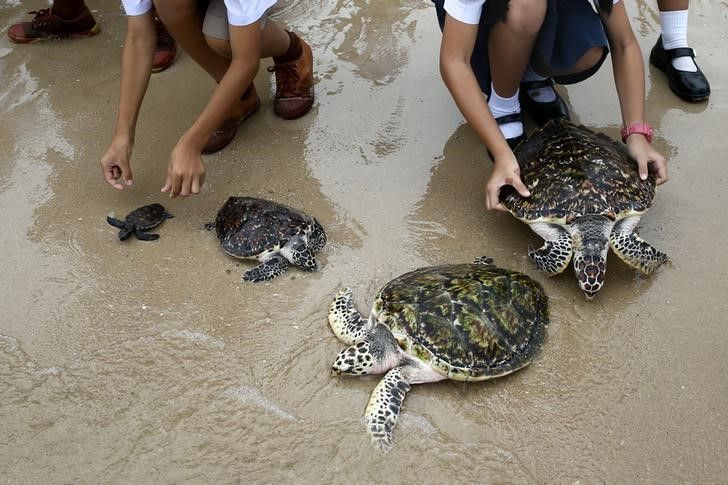
On some beaches in the Great Barrier Reef of Australia, climate change is causing almost all sea turtles to be born female. That's not normal and it's not good for sea turtle populations. It could even mean the extinction of that group of animals, the biggest population of green sea turtles in the world.
When a sea turtle lays a clutch of eggs, the sex of the embryos inside have not yet been determined. The embryos inside respond to the temperature, developing as male if colder and female if warmer. If they develop at the ideal, "pivotal" temperature which varies based on genetics, half will be male and half will be female.
But new research published in the journal Current Biology found that the ratio of male to female hatchling turtles is nowhere near the ideal 50/50. In one population, on the southern end of the Great Barrier Reef, 65 to 69 percent of hatchling turtles were female. That's already a skewed ratio, but it's not the worst case.
On the northern end of the Great Barrier Reef, more than 99 percent of juvenile and young adult turtles are female. The turtles on the northern end may be experiencing more extreme feminizing because they incubate in a warmer area, closer to the equator. Both live off the east coast of Australia.
The problem is increasing with the generations. In the northern population, the sex ratio of adult green sea turtles is 87 percent, compared to 99 percent in young adults and juveniles. That difference means the effect is growing more severe.
The scientists calculated that the northern population has been delivering primarily females for more than 20 years, corresponding to rising temperatures in the region. "The complete feminization of this population is possible in the near future," the authors wrote. When the population is completely female, there won't be another generation to study.
Green sea turtles are not the only organisms threatened by climate change in the Great Barrier Reef. The warming temperatures have also resulted in severe coral bleaching, in which the reefs eject the algae that they should be eating. As a result the corals die, disrupting the ocean ecosystem along with the people and animals that depend on the reef.
Uncommon Knowledge
Newsweek is committed to challenging conventional wisdom and finding connections in the search for common ground.
Newsweek is committed to challenging conventional wisdom and finding connections in the search for common ground.
About the writer
Kristin is a science journalist in New York who has lived in DC, Boston, LA, and the SF Bay Area. ... Read more
To read how Newsweek uses AI as a newsroom tool, Click here.








